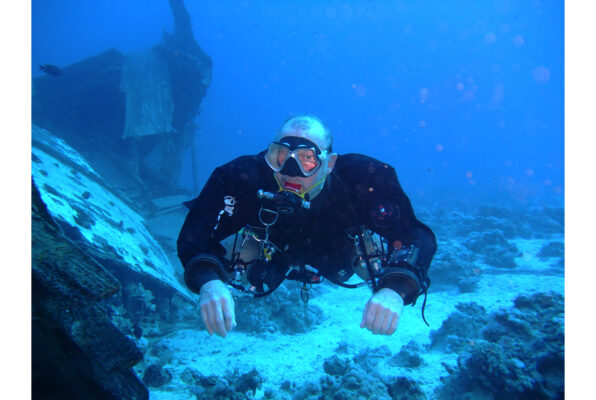Why we fly
Robin’s Story

"Without the helicopter taking me to Hull I would have been in a land ambulance on oxygen for over two hours. If anything had gone wrong in that time the situation would have been a lot more serious."
A training exercise became a real-life emergency when diving instructor Robin Norman lost consciousness during a 30-metre dive at Stoney Cove in Leicestershire.
Robin (72), who has been diving for 18 years and is an advanced diver, was in the water assessing another diver when the incident took place.
“It was the first time anything like this had happened to me in over 2,000 dives around the world and unfortunately the trainer became the victim,” he says.
The diver with Robin performed a controlled buoyant lift to get him to the surface as safely as possible and as soon as he was out of the water, he was given CPR.
Derbyshire, Leicestershire & Rutland Air Ambulance was called to the scene and by the time the critical care crew arrived, Robin had regained consciousness and was reporting that he had no joint or chest pains and was fully aware of his surroundings.
However, there was concern that Robin could suffer decompression sickness – the symptoms of which can often only become apparent up to 48 hours later.
It was therefore vital to get him as quickly as possible to the nearest hospital with a Hyperbaric Unit and where a recompression chamber was available.
It took the air ambulance just 32 minutes to fly Robin to Hull Royal Infirmary.
Tests at the hospital revealed that Robin had no damage or excess fluid in his lungs. He spent the night under observation and on oxygen and was allowed home the next day.
It is still unexplained what happened to Robin to cause him to black out when he was under the water. The weekend before he had been diving in the sea at the same depth with no problems.
He will have to have a medical to check his fitness before he can dive again but since the incident on 9 May he has felt fine.
“The survival rate for the sort of incident I experienced isn’t very high, so I am very lucky,” says Robin.
“Without the helicopter taking me to Hull I would have been in a land ambulance on oxygen for over two hours. If anything had gone wrong in that time the situation would have been a lot more serious,” he adds.
Robin is full of praise for the air ambulance crew who he says: “showed professionalism beyond words.”
He is also extremely thankful to his diving partner on the day, Ruby Wood – a paramedic – for her “quick action” and staff at Stoney Cove who called the emergency services and helped administer CPR.
The incident has confirmed Robin’s belief that many people take air ambulances for granted and don’t support the charities that operate them because they don’t think they will ever need their services.
“What happened to me proves that you can’t think that because you have done something safely repeatedly you won’t have an accident. We are not in control of circumstances, and you just don’t know if you are ever going to need the services of an air ambulance, the emergency services or a hospital,” he says.
“Why the air ambulance is run by a charity when as a country we give millions of pounds to other less vital causes is beyond me,” he says.
